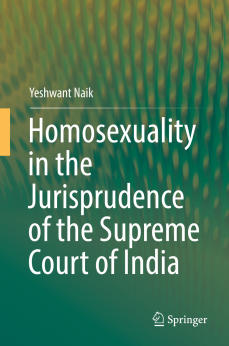Homosexuality in the Indian Jurisprudence
Legal expert Yeshwant Naik analyses the legal modernisation dynamics in India

The adjustment of Indian law with regards to questions of homosexuality to international human rights standards is the focus of a monograph by legal scholar Dr. Yeshwant Naik of the WWU. The jurist illustrates how the modernisation dynamic causes a “crisis of tradition” in Indian law. The book is the result of the Cluster’s project A2-7 “Pluralism and the Justification of Norms in the Modern Age” by legal scholar Prof. Dr. Thomas Gutmann. The reluctant adjustment of Indian law of homosexuality to international standards and the related crisis of tradition fits into our reflections on a theory of the ‘normative modern age’ in project A2-7”, says Thomas Gutmann. The book “Homosexuality in the Jurisprudence of the Supreme Court of India” is published by Springer International in Cham and New Delhi.
In his study, using sentences on homosexuality, Dr. Naik shows how jurisprudence of the Supreme Court of India has changed within the past ten years. Naik examines the court’s opinion on issues such as equality, family, matrimony and human rights from an international perspective. Using the jurisprudence of the European Court of Human Rights and international conventions, he compares to what extent the legal and social discrimination of the gay, lesbian, bisexual and transgender community takes place. Furthermore, Naik contrasts the jurisprudence of the Supreme Court with reflections on which alternative forms of living and family could claim recognition and protection according to international and Indian law.
Challenges for Patriarchy and Hegemonic Masculinity
The author supplements the jurisprudent analysis with a socio-anthropological one: the book shows, according to Thomas Gutmann, that homosexual masculinity in India challenges patriarchy and hegemonic masculinity despite its marginalisation. “It protrudes into a research gap by reconstructing contemporary homosexual masculinity in a narrative way and analysing the emerging gay lifestyles in India.” The analysis is thought to be uniting current research approaches on homosexuality with a particular interest on the circumstances in India. Dr. Naik discusses his research results by using the theory of “Living Law” by the Austrian sociologist of law Eugen Ehrlich. (dak/vvm)

